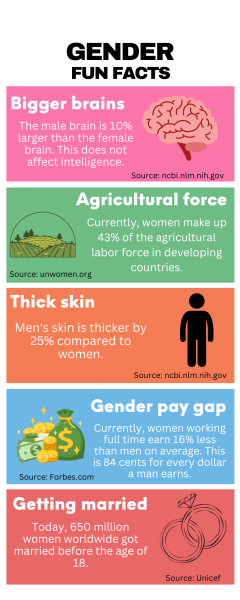Women’s brains excel in feeling while men’s brains excel in analyzing, renowned British psy-
chologist Simon Baron Cohen theorized in 2003 . But this is just a theory.
Three years later, Colin Dampier (‘07), a Pirate’s Eye journalist, wrote the article “Student couples
divulge on gender differences in their relationships.” Using Cohen’s theory Dampier argued that “beneath the surface of the body lies intellectual differences and tendencies that could affect interactions between [couples]”.
Let’s set the record straight: In the last two decades, how we understand gender differences has changed. Although differences in the brain and body exist, there is no difference in intellectual potential between males and females. This is reflected in the way we are taught at South and the change seen in the world.
Both Dampier and Cohen published papers supporting the so-called science behind our gender stereotypes. These publications discourage women and men from challenging their stereotype.
For example, Cohen uses an assumption linking women to empathizing and men to analyzing. 70.1% of humanities students were female. Cohen says that because people in humanities
are more empathetic, women are more empathetic.
He also says that students lean to STEM and humanities majors, respectively, based on their gender. In reality, anyone can be empathetic and analytical.
It is true that certain genders lean to certain career paths. According to the American Association of University Women, women only make up 34% of the workforce in STEM.
“These differences exist not because of the way you were born but how you were raised,” said Aahana Ardey (‘26). “I feel like as a girl we’ve seen boys being pushed into math while we aren’t encouraged the same.”
Our upbringings define who we become, and our upbringings vary by gender.
“When I started to play sports, I remember my grandmother and my mom just didn’t understand why I loved to do that,” said Health and Physical Education teacher Ms. Lisa Hayden. The traits that women tend to have such as “telephone banter” or being a “humor appreciator,” as Dampier mentioned, are what generations of women have been
taught.
Dampier also said males are more left-brained, and more analytical, while women are more right-brained and in touch with their intuition. In the past 18 years, this has been proven as a
myth.
“You have two hemispheres and you use both of them for certain tasks,” said Psychology teacher, Ms. Mary Jenoriki. “This data was done in the early 2000’s or even the 90’s. Brain imaging and our technology with research has come full circle, so a lot of what we thought we knew, we’re realizing we haven’t even scratched the surface of it.”
Dr. Kate Heavers, who appeared in the original article from 2006, agreed saying, “New data comes
in, I revise my understanding and then, I teach it differently”.
In Dampier’s article, Dr. Heavers said that women rely heavily on their intuition. She also said that we should look for people who don’t find themselves “hot”. This is reflecting the time period the article was written.
“My ideas have definitely changed based upon my transgender students.” Dr. Heavers added. Since before 2006, the conversation about gender has been changing from being binary to becoming a spectrum. “Having a certain number of chromosomes does not decide for a substantial number of people who they want to be,” Dr. Heavers said.
Gender equality efforts have caused a change in gender roles. “In the last 20 years, there has been a push for women to be in STEM, that has never really occurred,” said Ms. Hayden.
According to the National Center of Science and Engineering Statistics, “the proportion of the STEM workforce that were women increased by 3 percentage points from 2011 to 2021.”
Dampier was correct about some of the genetic differences.
“Having raised boys and girls, there’s just some innate little differences,” said Ms.Hayden. “I’m sure there’s hormonal differences that come into play here and maturity level,” she added.
These differences do not make us any different in the way we interact.
Gender roles and societal pressures should not influence what you can or cannot do. Don’t let others’ expectations of your gender stop you from doing something different. Your potential ex ceeds others’ expectations of you.
ceeds others’ expectations of you.











